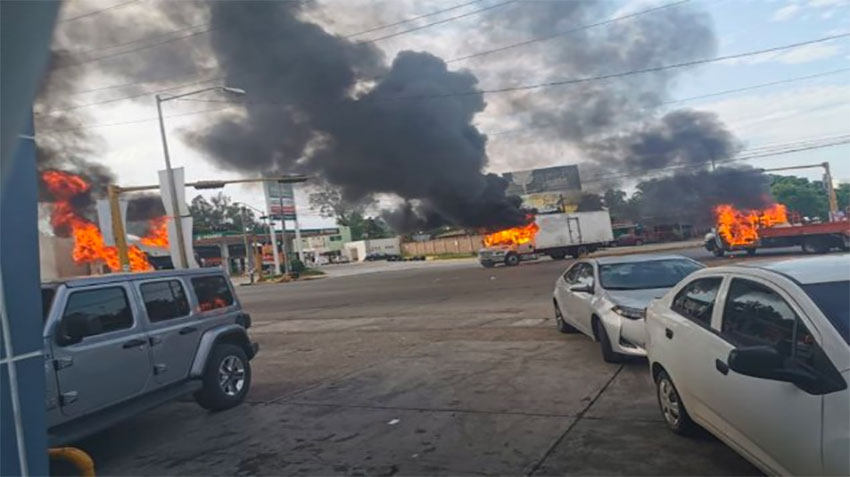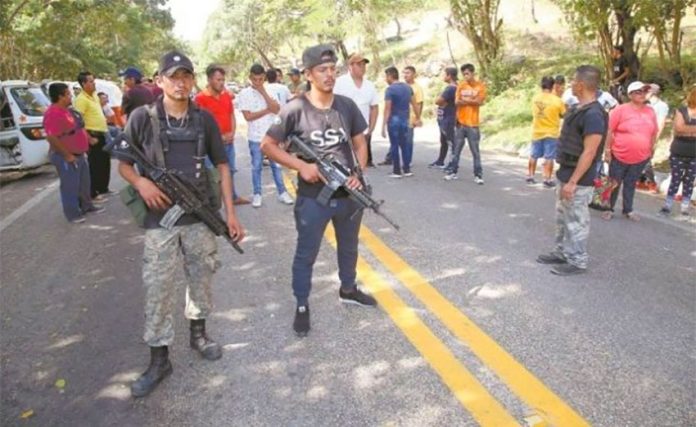There is a “high risk” of a cartel insurgency in Mexico this year, according to a non-governmental organization that analyzes violence around the world.
The Armed Conflict Location & Event Data Project (ACLED) said in its report Ten Conflicts to Worry about in 2020 that Mexico is facing a deteriorating security situation and continues to suffer “unprecedented levels of criminal and drug-related violence.”
Under the subheading “What to watch for in 2020,” the NGO said that Mexico is confronted with “an increasingly complex, fragmented and multipolar criminal market and a resolution to these structural problems is unlikely in the short term.”
The situation increases the possibility of “intensified conflict” this year, the ACLED said, anticipating that “brutal everyday violence” will continue to plague the country.
The record-high murder numbers seen in 2019 – there were more than 35,000 victims of homicide and femicide – will be surpassed in 2020, the organization predicted.
Several “particularly brutal” attacks last year have raised concerns that Mexico’s notorious drug cartels are “increasingly adopting insurgent techniques,” the ACLED said.
The response of the Sinaloa Cartel to an operation in October to capture a son of convicted trafficker Joaquín “El Chapo” Guzmán was a prime example.
In an unprecedented show of force, the cartel virtually seized control of Culiacán after the arrest of Ovidio Guzmán López, outmuscling state and federal security forces and forcing authorities to take the decision to release the suspected criminal leader in order to avoid a bloodbath on the streets of the Sinaloa capital.
The retaliatory attack raises fears that cartels are stronger than the military, the ACLED said.
Indeed, Mexico’s most powerful criminal organizations have large arsenals of military-grade weapons at their disposal – and are not afraid to use them.
In contrast, the federal government continues to pursue a so-called “abrazos, no balazos” (hugs, not bullets) security strategy that favors addressing the root causes of violence with social programs rather than combating it with force.

To support its “high risk” of insurgency thesis, the ACLED noted that security forces also came under attack last October in Michoacán and Guerrero.
Thirteen state police officers were killed in the notoriously violent Tierra Caliente region of the former state on October 14 in an ambush allegedly perpetrated by the Jalisco New Generation Cartel, considered Mexico’s most powerful and dangerous criminal organization.
The very next day, the army came under attack in a community just outside the Guerrero city of Iguala. Fourteen suspected members of the Guerreros Unidos, a crime gang that allegedly murdered the 43 students who disappeared in Iguala in September 2014, were killed along with one soldier.
Further substantiating its insurgency prediction, the ACLED noted that nine members of a Mexican-American Mormon family were murdered in an ambush on a rural road in Sonora on November 4 and that a cartel “launched a military-style invasion” into the town of Villa Unión, Coahuila, on November 30.
The Coahuila attack, believed to have been committed by the Northeast Cartel’s military wing Hell’s Army, precipitated an hours-long gun battle with state and federal forces, leaving 22 people dead.
The ACLED asserted that “in addition to high levels of impunity, untrained security forces, and the general weakness of public institutions, the escalation of violence can be partially attributed to the fragmentation of cartels caused by law enforcement campaigns targeting their leaders . . .”
It said that splinter groups are competing violently over the existing drug trade but also diversifying their criminal activities by engaging in kidnapping, extortion, fuel theft and human trafficking.
The NGO also acknowledged that “by some accounts,” President López Obrador’s assumption of power may be linked to increased rates of violence because complicity between public officials and criminal groups has been undermined, “spurring uncertainty amid a struggle for new arrangements.”
In addition, it noted that critics argue that López Obrador has been unable to develop a coherent and effective security policy to fight cartel violence.
For his part, the president has conceded that his administration has not yet been able to reduce homicides but he and other senior officials have expressed confidence that the government’s social programs, along with the deployment of the National Guard, will soon achieve positive results.
To deflect growing criticism of the government’s approach to tackling the record high levels of violence, López Obrador maintains that the poor security situation is inherited.
“. . . I want to make it clear that we’ve been left with the aftermath . . . of a mistaken and corrupt security policy,” he said on January 22.
Mexico News Daily
